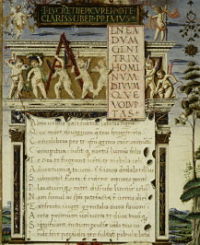58 - Reaping the Harvest: Lucretius
Posted on
Lucretius’ poem On the Nature of Things sets Epicureanism into verse. Peter takes a look at its treatment of the soul, free will and the swerve and human society.
Themes:
Further Reading
• K.A. Algra et al. (eds), Lucretius and his Intellectual Background (Amsterdam: 1997).
• D. Clay, Lucretius and Epicurus (Ithaca: 1983)
• D.J. Furley, “Lucretius and the Stoics” and “Lucretius the Epicurean: on the history of man,” both in Furley, Cosmic Problems (Cambridge: 1989).
• T. O’Keefe, Epicurus on Freedom (Cambridge: 2005).
• D. Sedley, Lucretius and the Transformation of Greek Wisdom (Cambridge: 1998).
• M.F. Smith, Lucretius: On the Nature of Things (Indianapolis: 2001).







Comments
De Rerum Natura
I read this excerpt from Lucretius at my mothers funeral in 2009:
No single thing abides; but all things flow__ .
Fragment to fragment clings
the things thus grow - Until we know and name them.
By degrees they melt, and are no more the things we know.
Globed from the atoms falling, slow or swift
_I_ see the suns, _I_ see the systems lift Their forms;
and even the systems and the suns
Shall go back slowly to the eternal drift.
Thou too, oh earth--thine empires, lands, and seas--
Least, with thy stars, of all_ the galaxies,
Globed from the drift like these,
like these thou too Shalt go.
Thou art going, hour by hour, like these.
Nothing abides. The seas in delicate haze Go off;
those moonéd sands forsake their place;
And where they are, shall other seas in turn
Mow with their scythes of whiteness _other_ bays.
The seeds that once were we - take flight and fly,
Winnowed to earth, or whirled along the sky,
Not lost but _disunited_.
LIFE LIVES ON.
It is the lives, the lives, the lives, that die.
Observe this dew-drenched rose of Tyrian grain--
A rose today ,,, But you will ask in vain tomorrow what it is;
and yesterday it was the dust, the sunshine and the rain.
This bowl of milk, the pitch on yonder jar,
Are strange and far-bound travelers come from far
This is a snow-flake that was once a flame--
The flame was once the fragment of a star.
I found the verses here: http://www.blackcatpoems.com/l/no_single_thing_abides.html
(The weird punctation was to help me with the vocal stresses)
LibriVox audio version
I found a reading of 'On the Nature of Things' at LibriVox:
http://librivox.org/on-the-nature-of-things-by-titus-lucretius-carus/
I was curious to hear a reference to 'corn'. I was under the impression that corn was brought from the 'New World' after the 1490's. Am I wrong about that?
clem
In reply to LibriVox audio version by clem
Corn
Hi Clem,
We're into the history of agriculture here which is less my area than the history of philosophy. But my guess is that "corn" is being used in the more generic sense of grain, rather than meaning the kind of corn that originated in the Americas.
Peter
In reply to Corn by Peter Adamson
corn
Hi guys,
Just stumbled across this having a look at the comments after listening to a hopwag as I always do and thought I just might suggest reading pliny's natural history book xviii if you want to know more about 'corn'/grain in the ancient world.
In reply to LibriVox audio version by clem
Corn in British English
The word "Corn" in older British English refered to any small bit. Think peppercorn, meaning small bit of pepper. It was also used to describe all grains. See https://en.wikipedia.org/wiki/Corn_Laws which refers not specifically to Maize but to all grains. It wasn't until much later that the word "Corn" took on it's current meaning.
Timely
Fascinating article in The New Yorker regarding philosophy and pandemics...
https://www.google.com/amp/s/www.newyorker.com/culture/culture-desk/inv…
The Philodemus Project
The link to the Philodemus Project returns a 404. What was it about?
In reply to The Philodemus Project by Andrew
Philodemus project
Oh thanks for noting the broken link, I have fixed it so you can see for yourself. Here it is again:
https://classics.ucla.edu/faculty-projects/philodemus-project/
Add new comment